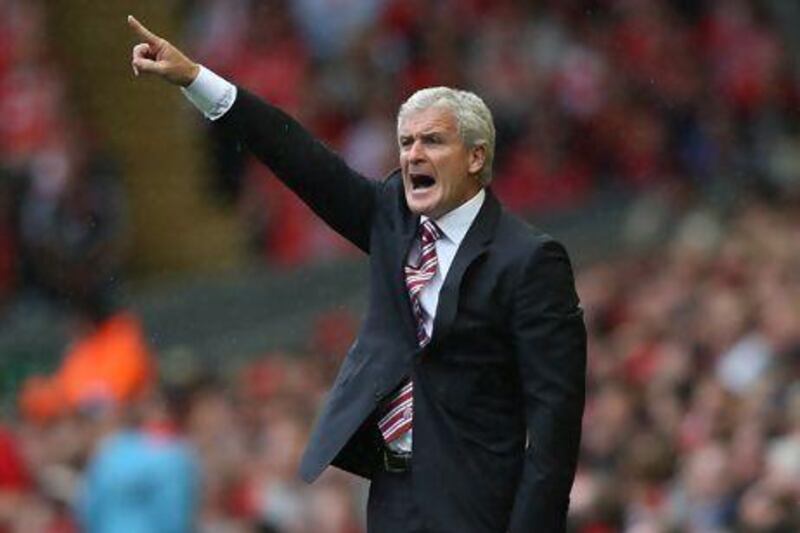For the best part of four decades, Stoke City's anthem has been Tom Jones's Delilah.
Over the past seven years, however, it has had competition for the title of the most-sung song at the Britannia Stadium.
The American spiritual Swing Low Sweet Chariot was first adopted by the England rugby team and then by the Stoke support, revelling in their status as the scourge of purists and embracing the criticisms of their direct style of play.
At Anfield last week, there was a new addition to Stoke's soundtrack. "We're Stoke City and we're passing the ball," the travelling fans sang, and their side were. Not like Barcelona, admittedly, nor in a manner to bring unflattering comparisons with the Neanderthal football produced in England during its darker decades.
The transformation of a team has begun. For some, the new manager Mark Hughes, whose Blackburn team were accused of being direct and defensive, makes for an unlikely revolutionary, but a new ethos is being implemented at Stoke.
As the assistant manager Mark Bowen said: "The adage of getting the ball as far away from your own goal has done its time. It's more about possession now." Stoke had 45 percent of possession at Anfield. While that was not a dramatic improvement on last year's overall average of 43 percent, it was away from home and against a team, in Liverpool, who like to have a lot of the ball.
Stoke, in contrast, have been starved of it. Under Tony Pulis, they were efficient, organised and defensively diligent. They made the most of dead-ball situations but the goals dried up; they averaged under one a game in each of the last two campaigns and Stoke finished between 11th and 14th in each of their five full seasons in the Premier League. The top of the bottom half, it would suggest, is as far as a team can go without the ball.
As his signing of Charlie Adam indicates, Pulis recognised as much. As his struggle to find a place for the Scot in his side demonstrated, the manager could not shrug off his straitjacket. Instead, he hung up his Stoke City baseball cap and tracksuit for a final time; Pulis was dismissed in May as Stoke signalled it was time for a change.
Enter Hughes, with a reputation to rebuild after his disastrous time at Queens Park Rangers. Stoke are trying to shed a tag of their own. They are trying to play through the midfield rather than bypassing it. While players invariably pay lip service to a new regime, the sense is that they have really bought into Hughes's new approach. They impressed in pre-season. The same group – the Holland left-back Erik Pieters was the only new signing to feature at Anfield – are producing a different brand of football.
Yet the goalkeeper Asmir Begovic cut to the heart of their problem. "We can't just say we need time and we need to get better," he said. "We need to work and learn on the go and get results." But for Simon Mignolet's late penalty save, they might have had a 1-1 draw at Anfield. But for Begovic's brilliance and his woodwork, however, they could have lost 5-0.
It was telling that Stoke's best chances still came from set-pieces.
Possession did not bring incision. In one respect, that will he harder. Hughes has added another central midfielder, sacrificing either a striker or having Jonathan Walters moving into a wider position. The quest is on to find a forward who can lead the line on his own, join in a passing game and contribute 15 or so goals. Locating one is no simple task.
Stoke's fortunes may depend upon Hughes's striking search along with their ability to emulate Pulis's teams by churning out results at the Britannia Stadium. It is why Saturday's game against Crystal Palace assumes such significance: Hughes has not won a league game since May 6, 2012, and the impetus victory provides would aid the transition into a new era.
"We knew when we are trying to change a football club it is not going to happen overnight," Bowen said. Over 90 minutes, however, they have a chance to not just win, but win with style. And that, for Stoke, would be a welcome change.
Mark Hughes teams
Blackburn 2004 to 2008 Initially negative, they attacked with greater frequency as Hughes made a series of inspired signings. Never lost their abrasive edge, however, and were bottom of the Fair Play League.
Manchester City 2008/09 More adventurous than his Blackburn sides but struggled to find the right balance between defence and attack and conceded too many goals as expensive recruits failed to gel.
Fulham 2010/11 Without being prolific, maintained Fulham's tradition of passing but had an excellent defensive record and, unlike previous Hughes teams, did well in the Fair Play League.
QPR 2012/13 It was not a question of being positive or negative, fair or unfair; it was about being poor. Wasted money on a mismatched group and underachieved grievously.
Follow us
[ @SprtNationalUAE ]






